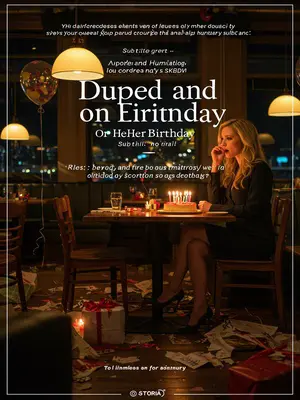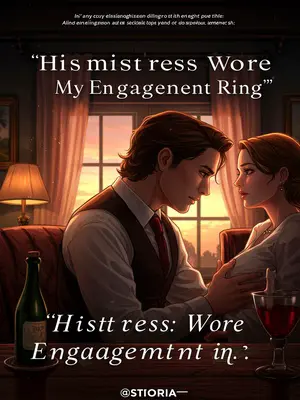Chapter 2: When Everything Shatters
As the only daughter of the Hamilton family—one of Maple Heights’ oldest names—I was always meant to be Caleb’s future fiancée. We both knew it, deep down.
Around here, everyone’s future gets mapped out before they can even spell their own last name. The Hamiltons and the Thompsons had been intertwined since the first county fair. Neighbors still told stories about our families running the Fourth of July parade and winning the blue ribbon for best pie. There was this silent expectation—a whispered agreement at potlucks and school board meetings—that Caleb and I would end up together. It felt less like a promise and more like gravity.
My mother and Mrs. Thompson, the mayor’s wife, had been close friends. When I was seven, my dad died overseas in the Army, and not long after, my mom got sick. Before she passed, she asked Mrs. Thompson to look after me.
The day my father’s folded flag came home, Mrs. Thompson was already at our door with a casserole and a gentle hand on my shoulder. My mom’s illness crept in like an early frost, stealing her voice and her laughter. I remember overhearing hushed conversations in the kitchen—promises made over mugs of coffee, the kind of promise that binds families together. When Mom finally left us, Mrs. Thompson’s hug was the only thing holding me together.
From then on, I lived in their big two-story house. No more spoiled only child—I learned under Mrs. Thompson’s watch how to carry myself like someone who might be the mayor’s daughter-in-law one day.
The Thompsons’ house sat on the corner of Sycamore and Main, a stately home with a wraparound porch and a swing that creaked in the wind. Mrs. Thompson was strict but fair. I learned to set the table just so, to thank the mailman by name, and how to walk into a room with my chin up. There were etiquette lessons at Sunday brunch and little reminders to keep my elbows off the table. Most days, I felt like I was wearing someone else’s skin, trying to be the girl they needed me to be.
Caleb was three years older than me. Even as a kid, he had that calm, unreadable air you’d expect from someone who’d grown up in a family like his. I always thought he was just born that way—until today.
Even back then, Caleb moved through life with a kind of quiet confidence. He was the type to hold open doors, offer his jacket when the wind picked up, and never let anyone see when he was rattled. I used to watch him from the porch swing, trying to decipher what went on behind those thoughtful eyes. Today, that calm was gone—replaced by something sharper, colder. It made me wonder if I’d ever really known him at all.
It was my birthday, but Caleb went with Rachel Jennings to see the wildflowers outside town. She still wasn’t satisfied, because she came to find me as I waited for Caleb in the Thompsons’ living room, and smashed the locket my mother had left me.
The locket was my last link to Mom. Rachel’s voice was syrupy sweet when she barged in, her smile all teeth. She strutted in like she was queen of the prom, flicking her hair and drawing out my name like it was a joke only she got. I barely had time to react before she snatched the locket from my hands, sneering, “Don’t you think it’s time you moved on?” Then, without a flicker of guilt, she crushed it beneath her heel. My heart nearly stopped. The world shrank to the sound of metal crunching under her heel. All the air left my lungs. It was like losing Mom all over again—sudden, senseless, and mean.
Furious, I slapped her.
My hand hovered, shaking. For a split second, I saw Mom’s face—then I swung. The sound echoed—sharp, shocking. My hand stung, but I didn’t care. Rachel stumbled back, hand pressed to her cheek, eyes wide with indignant surprise. For the first time, she looked scared of me. I’d never hit anyone before, but some things you just can’t let slide.
That was when Caleb walked in.
He wasn’t as put-together as usual; his face was stormy as he helped Rachel up.
His hair was a little mussed from the wind, jacket half-off his shoulder. He barely glanced at me, kneeling next to Rachel and checking her wrist for a bruise. There was a flash of disappointment in his eyes—at her, at me, maybe at himself. Whatever it was, it felt like he was miles away.
Afraid he was mad, I hurried to explain:
“Caleb, I didn’t mean to hit her, it’s just that she broke—”
The words tumbled out, shaky and desperate. My voice caught on the word ‘broke,’ the sting of betrayal tightening my chest. I half expected him to cut me off, to see the truth behind my anger, but his eyes were hard as glass.
“Doesn’t matter what she did, Nat. You can’t just go around hitting people.”
Caleb’s voice was cool, but every word hit like a punch in the gut.
His tone was the one he saved for student council meetings or breaking up arguments at church youth group—calm, measured, unyielding. It left no room for excuses. I felt every pair of eyes in the house turn toward us, the air humming with judgment.
“Natalie, I’ve let you get away with too much these past few years.”
“If your attitude comes from this engagement, maybe it shouldn’t count at all.”
Everything seemed to go silent. Only Caleb’s words echoed in my head. I wanted to scream, to make him see how wrong he was. But all I could do was stand there, frozen, while the floor seemed to drop out from under me.
The clock in the hallway ticked louder, drowning out my heartbeat. For a second, I thought maybe I’d misheard. But there was no mistaking the finality in his voice. Every hope I’d quietly nursed about us withered in that moment.
I stared at him, my voice shaking:
“Caleb, what did you just say?”
My throat was dry, voice barely above a whisper. The locket—what was left of it—felt heavy in my hand. I’d spent years shaping myself into the girl I thought he wanted, the girl this family expected. Was it all for nothing? I searched his face, hoping for a sign that he didn’t mean it, that he’d take it back.
Ever since I learned I was supposed to be the mayor’s future daughter-in-law, I’d always been careful about how I acted. Even when it was just us, I stuck to ‘Mr. Thompson’—like if I kept it formal enough, I wouldn’t mess anything up.
It was a small-town habit—titles mattered. Out in public, I was always ‘Miss Hamilton’ to the grownups, and ‘the Hamilton girl’ to the rest. Calling him ‘Mr. Thompson’ felt like armor, a way to remind both of us what was at stake. But now, the title felt empty, just another mask slipping off.
I looked at him—a nineteen-year-old, tall and steady, with sharp features and eyes that always seemed far away. I’d watched him for ten years, but today, it felt like I was seeing him for the first time.
He stood taller than I remembered, framed by the afternoon light pouring through the window. His jaw clenched, eyes distant. For a decade, he’d been my constant—the steady hand guiding me through every school dance, every awkward church potluck. Now, I saw the distance between us—an entire lifetime wedged in the space of a heartbeat.
“Did you really mean what you just said?”
He didn’t look at me. He turned and led Rachel back toward the kitchen.
The sound of their footsteps faded into the clatter of distant silverware and voices in the kitchen. I felt the ache bloom in my chest—a hollow, aching loneliness that pressed at my ribs. I watched them disappear, wishing I could rewind the last five minutes.
Maggie, the housekeeper, was still kneeling on the floor, picking up the broken pieces, but I couldn’t hear her anymore.
Her gentle humming and soft reassurances were muffled, like I was underwater. She looked up, worry etched on her face, but I couldn’t bring myself to meet her gaze.
If it doesn’t count, then so be it.
After all these years, I’m just tired.
Letting go felt like stepping off a ledge I’d been teetering on for years. The fight drained out of me, replaced by a strange, freeing numbness. Maybe this was what growing up felt like in Maple Heights—finally choosing your own path, no matter how much it hurt.













